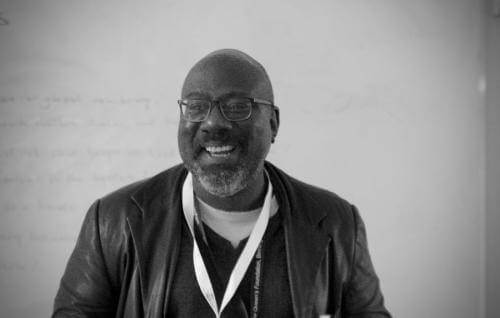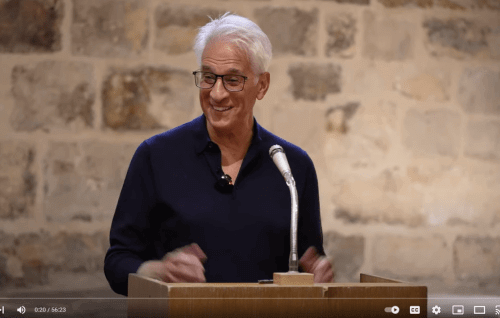Audacious Hope
Audacious Hope
Sharon Prentis reflects on how we can live a life grounded in biblical hope.
1. Viewing from God's perspective
On a recent walk I came across a flower that grew through the cracks in a concrete pavement. The sight of it made me think of hope. Despite the seemingly impenetrable material, it had found a way to grow.
Hope is a lens though which we view the world. In the Old Testament there are two words that are associated with what it means to hope. One implies “waiting” and the other comes from a root word meaning "rope". They both suggest the anticipation that comes with tension or pressure. Eventually the tension will end, bringing release.
Seeing past the ‘strain’ comes about by faith. Trusting that even if we don’t see the whole story, someone else does. Biblical hope is based on a person - Jesus Christ - not on blind optimism that chooses to view circumstances through rose-tinted spectacles. Biblical hope is audacious, it points to Christ who gives us strength to stand and wait – so we do not lose heart. To persevere when things are hard in the knowledge that our inner self is being renewed day by day… causing us to look past the immediate present, to the unseen things that are eternal. (2 Corinthians 4:16-18).
Hope then is anticipating something better, which can be hard! The degree to which we feel hopeful arises from the immediacy of what is being experienced. But viewing life from God’s perspective involves choosing instead to see that circumstances, however difficult, can be worked out for the better. As Jesus said, “With people this is impossible, but with God all things are possible” (Matthew 19:26). Biblical hope then is not grounded in our circumstances but conveys a possibility that cannot be imagined by the human mind, yet requires us to trust that we cannot always see where God is at work.
2. Awakening a hope that inspires
Wars, rumours of wars, pestilence and disease. At times, it is difficult to see how things can change. The news can seem like perpetual darkness only punctured by occasional light - if at all!
Holding on to faith requires acting against the spirit of the times. According to the African American theologian Howard Thurman it means having the courage to live in a way that ‘kindles a hope that inspires.’ When Martha and Mary sent for Jesus, they were grieving the death of their brother Lazarus (John 11:19-21). Although they knew how much their friend, Jesus loved them, they must have felt such desolation.
It is times like those, during acute pain and disorientation, when we look for something that can bring relief. It is also in those times that we learn the courage to speak out of the despair that has no answers and still dare to hope. Living in a way that kindles hope means bearing witness to the present reality, but says also that the impossible is possible.
As we embrace this certainty, in faith, we are alerted to the fact that we are not by ourselves. There is something beyond our immediate experiences which we can hold onto.
The writer of Proverbs encourages the reader to ’Trust in the Lord with all your heart, and not lean on your own understanding’ (Proverbs 3:5). The first step is acknowledging that trouble and suffering do not always make sense. When we do that, what we then have left is not resignation but an opportunity for the illumination that faith brings - looking past difficult experiences to potential opportunities for grace. Sometimes they are obvious to us, other times they are not!
We can have the courage to face the future knowing that we do this not in our own strength but by God’s Grace. Following Christ means being daring - putting our confidence completely in him when things may not look as though they are working out.
3. A song in a weary throat
Pauli Murray was a Civil Rights lawyer, poet and Episcopal priest. She lived at a time when exclusion and explicit discrimination based on gender, race and sexual orientation was not only normal but pursued! Pauli’s sense of doing what was right continued to underpin her work despite the challenges. One of my favourite lines in her poetry talks about ‘hope being a song in a weary throat’.
While some things have changed, discrimination of all kinds still exists. A quote attributed to St Augustine is that “Hope has two daughters; their names are Anger and Courage. Anger at the way things are, and courage to see that they do not remain as they are.” While there is a debate about whether he said it or not, there is something powerful about resisting the state of despair and apathy that paralyses us from pursuing righteousness. Hope says something about our humanity, our ability to seek justice, mercy and humility and exercise compassion that anticipates the greater vision of the kingdom of God.
Christ is the focus of all hope. His death, resurrection and ascension remind us that circumstances do not have the last word. Christ does! It is then we can say as the psalmist – ‘As for me, I will always have hope; I will praise you more and more’ (Psalm 71:14). The daily act of putting hope into action glorifies God and speaks to the tension between the now, the faith that enables us to stand, and the reality of what is to come.
Psalm 40:3 declares that God will put a new song in our mouth. In a world where there are multiple voices clamouring for attention and where some voices are muted, God’s song resounds with the hope of how things should – and can – be better.
4. A song in a weary world
The disciples must have been in a perpetual state of wonder and surprise after the resurrection of Jesus Christ. He was among them - speaking, cooking breakfast and talking to them about the kingdom. Only this was not just inspiring, it must have led them to think that anything was possible. After the roller-coaster ride of the previous days, their hope was translated into unbounded faithfulness and joy.
Then he leaves, demonstrating that God is all powerful. The ascension (Luke 24:50–53), paradoxically, reminds us that Christ does not leave us alone to face the challenges of life that inevitably come. The sending of the Holy Spirit, the Comforter, reminds us that God’s love is always with us and inspires us to keep going, to keep holding on. As it says in Titus 3:7, being justified by his grace we can become inheritors according to the hope of eternal life. When we embrace this, we begin to live out hope.
Every day as dawn breaks and night ends, a new day is heralded by the sound of bird song. Nature’s hymn of faith sings of new possibilities. When Jesus ascended into heaven there must have been a mixture of anticipation and trepidation at what lay ahead, but also the reassurance that they would never be alone must have been of great encouragement. We may be lonely, but the reality is Christ never abandons us and is with us always (Matthew 20:28).
With so much going on in the world right now it is difficult, even challenging, to have audacious hope. But because we can see Christ’s glory we can! Yes, life is complex and unpredictable, but hope is a precious gift, allowing us to look beyond ourselves, to trust in God’s goodness and that we will be held in this uncertain time.








